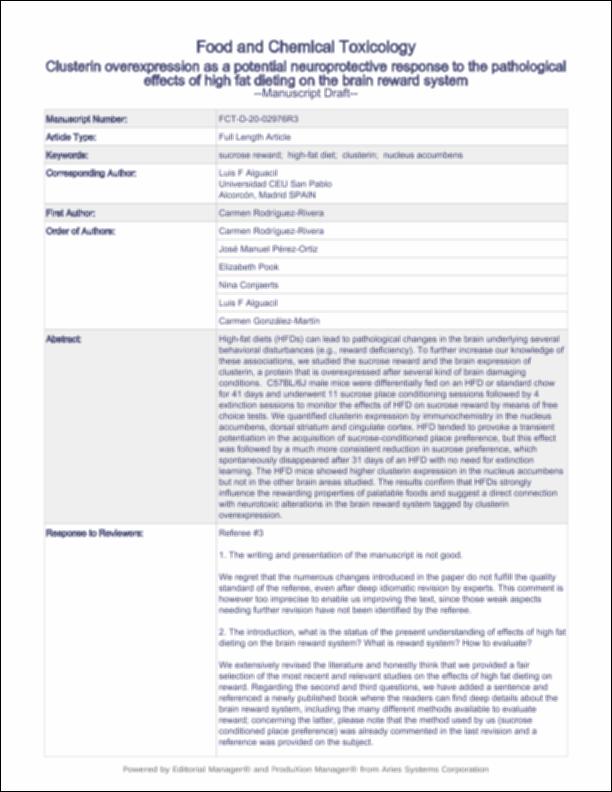Please use this identifier to cite or link to this item:
http://hdl.handle.net/10637/15370Clusterin overexpression as a potential neuroprotective response to the pathological effects of high fat dieting on the brain reward system
| Title: | Clusterin overexpression as a potential neuroprotective response to the pathological effects of high fat dieting on the brain reward system |
| Authors : | Rodríguez Rivera, Carmen Pérez Ortiz, José Manuel Pook, Elizabeth Conjaerts, Nina Alguacil Merino, Luis Fernando González Martín, Carmen |
| Keywords: | Clusterin; High-fat diet; Nucleus accumbens; Sucrose reward |
| Publisher: | Elsevier |
| Citation: | Rodríguez-Rivera C, Pérez-Ortiz JM, Pook E, Conjaerts N, Alguacil LF, González-Martín C. Clusterin overexpression as a potential neuroprotective response to the pathological effects of high fat dieting on the brain reward system. Food Chem Toxicol. 2021 Jun;152:112186. doi: 10.1016/j.fct.2021.112186. |
| Abstract: | High-fat diets (HFDs) can lead to pathological changes in the brain underlying several behavioral disturbances (e.g., reward deficiency). To further increase our knowledge of these associations, we studied the sucrose reward and the brain expression of clusterin, a protein that is overexpressed after several kind of brain damaging conditions. C57BL/6J male mice were differentially fed on an HFD or standard chow for 41 days and underwent 11 sucrose place conditioning sessions followed by 4 extinction sessions to monitor the effects of HFD on sucrose reward by means of free choice tests. We quantified clusterin expression by immunochemistry in the nucleus accumbens, dorsal striatum and cingulate cortex. HFD tended to provoke a transient potentiation in the acquisition of sucrose-conditioned place preference, but this effect was followed by a much more consistent reduction in sucrose preference, which spontaneously disappeared after 31 days of an HFD with no need for extinction learning. The HFD mice showed higher clusterin expression in the nucleus accumbens but not in the other brain areas studied. The results confirm that HFDs strongly influence the rewarding properties of palatable foods and suggest a direct connection with neurotoxic alterations in the brain reward system tagged by clusterin overexpression. |
| Description: | Este artículo es la versión aceptada siguiendo la política de la revista |
| URI: | http://hdl.handle.net/10637/15370 |
| Rights : | http://creativecommons.org/licenses/by-nc-nd/4.0/deed.es |
| ISSN: | 0278-6915 |
| Issue Date: | 2021 |
| Center : | Universidad San Pablo-CEU |
| Appears in Collections: | Facultad de Farmacia |
Items in DSpace are protected by copyright, with all rights reserved, unless otherwise indicated.


